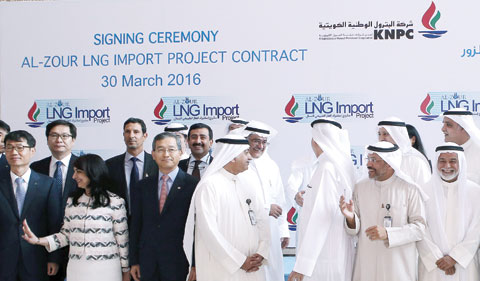 KUWAIT: Representatives of the Kuwait National Petroleum Company (KNPC) and South Korean representatives of the Hyundai Engineering and Construction (HDEC) pose for a family photo after signing an agreement as part of a Liquefied Natural Gas import project yesterday at the KNPC headquarters in Al-Ahmadi. — Photo by Yasser Al-Zayyat
KUWAIT: Representatives of the Kuwait National Petroleum Company (KNPC) and South Korean representatives of the Hyundai Engineering and Construction (HDEC) pose for a family photo after signing an agreement as part of a Liquefied Natural Gas import project yesterday at the KNPC headquarters in Al-Ahmadi. — Photo by Yasser Al-ZayyatKUWAIT: Kuwait yesterday inked a $2.93 billion contract with three South Korean firms for the construction of the largest Liquefied Natural Gas (LNG) import facility in the oil-rich country. The project, to be built at the Al-Zour refinery near the border with Saudi Arabia, was awarded to Hyundai Engineering Co, Hyundai Engineering & Construction Co and Korea Gas Corporation.
CEO of national refiner Kuwait National Petroleum Co Mohammad Al-Mutairi, who signed the contract, said the project is slated to be completed in the first quarter of 2021. OPEC member Kuwait is rich with crude oil but its natural gas production is too small to meet its needs. Every year it imports large LNG quantities to supply power plants, especially during the summer, and for use in the petrochemicals industry.
The facility will be part of a huge complex being built in Al-Zour, south of Kuwait City, which will also house a state-of-the-art 615,000 barrel-per-day refinery and a petrochemicals plant. Mutairi said the cost of the complex is expected to reach $30 billion. In October, Kuwait awarded contracts worth $13.2 billion to 10 international firms to build the refinery, which is set to come on stream in late 2019. In 2014, the emirate gave out contracts for a $12 billion project to upgrade two of its three existing refineries. Kuwait sits on 101.5 billion barrels of crude reserves-equivalent to around 7.0 percent of the world's proven reserves, according to the latest OPEC figures-and pumps around 3.0 million barrels per day.
In another development, BP and Kuwait Petroleum Corporation (KPC) have signed a framework agreement to explore possible joint opportunities for investment and cooperation in future oil, gas, trading and petrochemicals ventures. Kuwait Petroleum Corporation CEO Nizar Mohammad Al-Adsani signed the agreement with visiting BP CEO Bob Dudley. The framework paves the way for both companies to jointly invest and cooperate in oil and gas projects in Kuwait and globally.
"BP's commitment to Kuwait dates back to our participation in the discovery of the giant Burgan oil field in the 1930s and we are there today extending the life of the field," Dudley said. "We look forward to working with KPC to help the people of Kuwait realize the full potential of their nation's oil and gas resources and exploring new opportunities globally."
In addition to enhancing oil and gas recovery from Kuwait's existing resource base, the agreement also includes the intention to study opportunities for joint investment in future oil and gas exploration both inside Kuwait and globally. Other elements of the agreement cover possible future oil and gas trading deals including LNG trading and related ventures. Opportunities for cooperation and investment in midstream and petrochemical projects globally will also be considered under the agreement, including potentially deploying BP's proprietary paraxylene technology as part of KPC's petrochemicals projects.- Agencies










